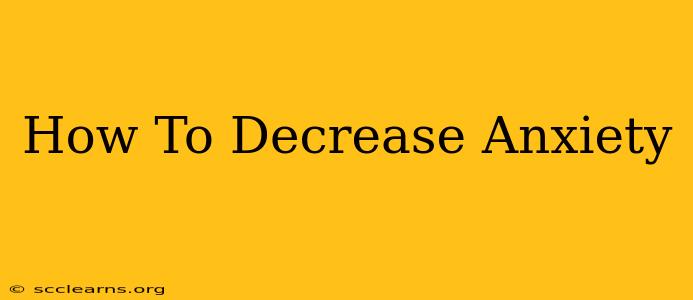Anxiety. That nagging feeling of unease, worry, and apprehension that can creep into our lives and disrupt our peace. It's a common experience, but that doesn't make it any less debilitating. Fortunately, there are many effective strategies to decrease anxiety and regain control of your emotional well-being. This guide explores practical techniques you can implement today to start feeling calmer and more confident.
Understanding Your Anxiety
Before diving into solutions, it's crucial to understand the root causes of your anxiety. Is it triggered by specific events, situations, or underlying conditions? Identifying these triggers can help you tailor your approach to anxiety management. Consider keeping a journal to track your anxiety levels, noting any potential triggers and your emotional responses. This self-awareness is the first step toward effective management.
Common Anxiety Triggers:
- Stressful Life Events: Job loss, relationship problems, financial difficulties, or major life changes.
- Health Concerns: Physical illnesses, chronic pain, or concerns about your health.
- Social Situations: Public speaking, social gatherings, or interacting with others.
- Specific Phobias: Fear of heights, spiders, or enclosed spaces.
- Genetics and Family History: A predisposition to anxiety can be inherited.
Practical Strategies to Decrease Anxiety
Now that we've explored the potential sources, let's delve into proven strategies to effectively manage and reduce your anxiety:
1. Lifestyle Changes: The Foundation of Anxiety Relief
Regular Exercise: Physical activity is a potent anxiety reducer. Even moderate exercise releases endorphins, which have mood-boosting effects. Aim for at least 30 minutes of moderate-intensity exercise most days of the week.
Healthy Diet: Nourishing your body with a balanced diet rich in fruits, vegetables, and whole grains can significantly impact your mood and energy levels. Limit processed foods, caffeine, and alcohol, as these can exacerbate anxiety.
Sufficient Sleep: Aim for 7-9 hours of quality sleep each night. Sleep deprivation can worsen anxiety symptoms. Establish a relaxing bedtime routine to promote better sleep.
Mindfulness and Meditation: Practicing mindfulness involves focusing on the present moment without judgment. Meditation techniques can help calm your mind and reduce racing thoughts. Even a few minutes of daily meditation can make a difference.
2. Cognitive Techniques: Reframing Your Thoughts
Challenge Negative Thoughts: Anxiety often stems from negative and catastrophic thinking. Learn to identify and challenge these thoughts, replacing them with more realistic and positive ones.
Cognitive Restructuring: This therapy technique helps you identify and change negative thought patterns. A therapist can guide you through this process.
3. Relaxation Techniques: Calming Your Body and Mind
Deep Breathing Exercises: Deep, slow breaths can activate the parasympathetic nervous system, helping to calm your body's stress response.
Progressive Muscle Relaxation: This technique involves systematically tensing and releasing different muscle groups to relieve physical tension associated with anxiety.
Yoga and Tai Chi: These mind-body practices combine physical postures, breathing techniques, and meditation to promote relaxation and reduce stress.
4. Seeking Professional Help
If your anxiety is severe or significantly impacting your daily life, don't hesitate to seek professional help. A therapist or counselor can provide personalized guidance and support, offering various treatment options such as therapy and medication. They can help you develop coping mechanisms and address underlying issues contributing to your anxiety.
Maintaining Long-Term Anxiety Relief
Reducing anxiety is an ongoing process. Consistency is key. By incorporating these strategies into your daily routine and seeking professional help when needed, you can significantly decrease your anxiety levels and cultivate a more peaceful and fulfilling life. Remember to be patient with yourself and celebrate your progress along the way. You deserve to feel calm, confident, and in control of your well-being.

